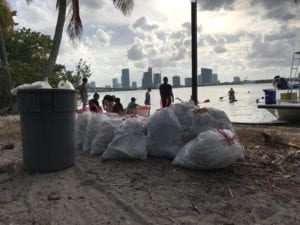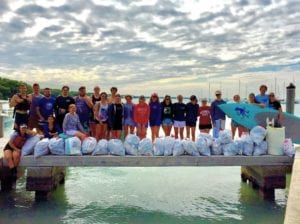

BY STEFFANI RUF
400 billion. That is the number of stars in our galaxy, the Milky Way.
Now let’s up the game to 5.25 trillion. That’s the number of pieces of plastic in our oceans.
Putting that into perspective, there are 13x more pieces of plastic in our oceans than there are stars in our sky.
Any oceanographer will acknowledge that there is only one ocean. There are, however, five smaller pieces to the bigger puzzle, the “world ocean” that is, which include the Pacific, the Southern, the Atlantic, the Arctic, and the Indian Oceans. There are over 7 billion people living on this planet, all connected by one ocean.
Here in South Florida, Miami is surrounded by stunning coastlines and sandy beaches – waterways and an oceanfront that everyone expects to be clean, exquisite, and attractive. People come from all over the world to spend time in Miami and the Beaches.
The local economy clearly thrives on tourism. The benefits are seen through the money brought into the area and the jobs that are provided to support this industry.
“But clearly visitors don’t come to Miami expecting to see the beaches and the ocean littered with plastic, trash, and empty cans and bottles – they don’t visit by the millions each year to witness waves of marine debris,” says Caitlin Pomerance, co-founder of Debris Free Oceans DFO), a Miami Beach based non-profit that is creating awareness of the proliferation of ocean waste through education.
Pomerance and Jeremy Waks founded the organization in 2014 to inspire local communities to take responsibility for their waste (specifically plastics) so that the beaches, reefs, and the ocean can retain their ability to thrive. DFO uses a five-step approach to facing marine debris:
- Reduce (single-use products);
- Reuse (products one already owns);
- Recycle;
- Recover (remove debris from the environment); and
- Redesign (remaking marine debris into other usable products).

By facing the issue of marine debris head on in this way, DFO has cleaned up more than 10,200 pounds of trash from reefs and coastlines of South Florida since 2014. They have educated more than 1,250 students about the issue, successfully consulted with two corporations to eliminate waste in their daily practices, and they successfully encouraged the City of Coral Cables to work toward becoming the first municipality in the State of Florida to ban plastic bags.
Debris Free Oceans does its important work through several effective programs. DFO hosts lifestyle awareness events such as eco-fashion shows and conducts education by presenting to students in classrooms. Additionally, they also provide sustainability consulting with corporations on how to become more green.
DFO also hosts engaging cleanup programs, such as SCUBA cleanups, paddle-board cleanups, and the ever-popular “Keg & Kleans” – where volunteers enjoy a cold beer donated by a local brewery and served in reusable cups after a long day of clean up on a local beach front.
“By offering a creative range of effective outreach and programming, and by working with a dedicated team of volunteers, our hope is to lift some of the burden that Miami and Miami Beach feel under the incredible weight of marine debris,” said Waks.
“We can no longer accept that the number of pieces of plastic in our world ocean so greatly outweigh the number of stars in our sky,” Pomerance added. “Debris Free Oceans is trying to change that, but we need your help to do it.” DFO has an office in South Beach, but mostly works remotely, at schools, parks, and beaches all across Miami-Dade County.
Local schools, businesses and organizations interested in hosting a presentation by a member of the DFO team or in scheduling a team-building cleanup are encouraged to visit www.debrisfreeoceans.org.
Steffani Ruf is a Program Intern with the Miami/Miami Beach based non-profit organization, Debris Free Oceans. She is a resident of Rochester, NY and a recent graduate of Queens College in New York City with a degree in Environmental Studies and a minor in Urban Studies.






The safest place for plastic is where it came from: in the earth, buried under dirt in a landfill. Recycling turns out to be the cause of plastic in the world’s oceans.
Great article, thank you. It’s just so sad that anyone would throw trash in the ocean.